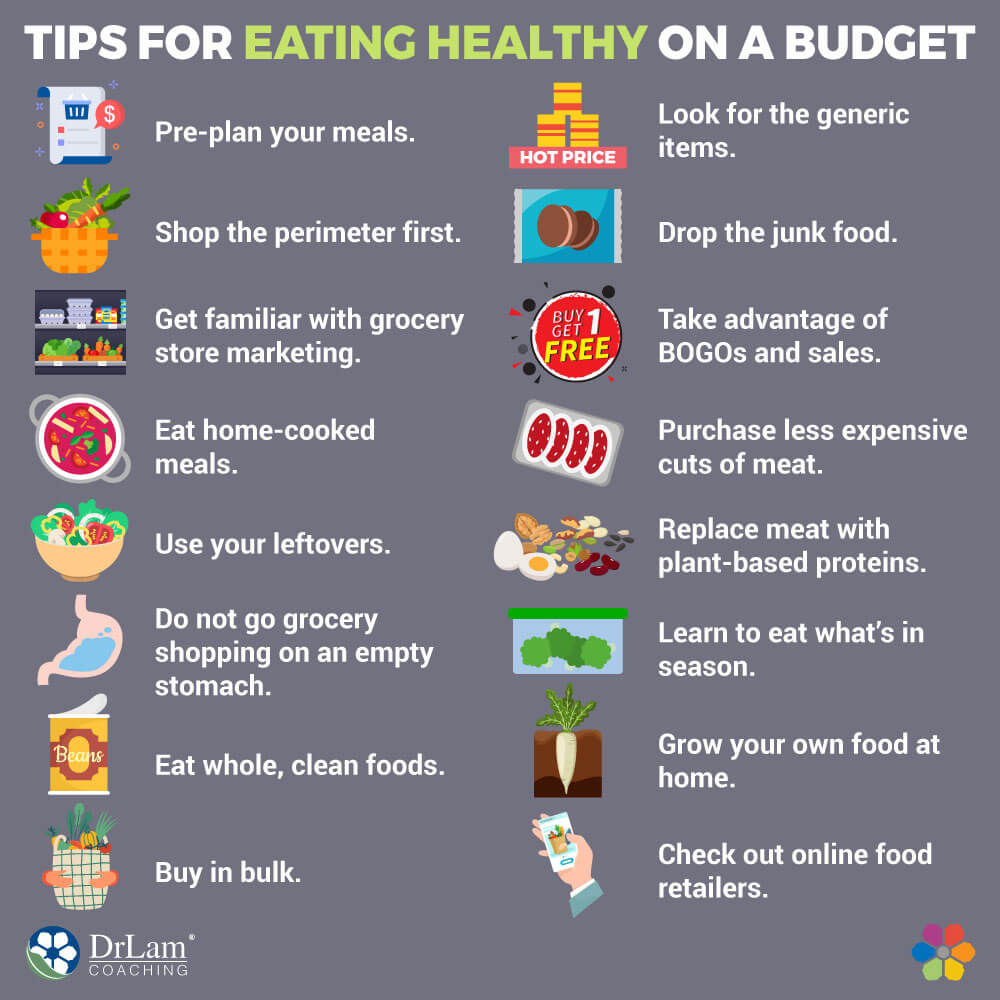Cooking on a Budget: Tips for Delicious and Affordable Meals


Smart grocery shopping
Tips for buying affordable and nutritious ingredients
When cooking on a budget, it's essential to make savvy choices when it comes to grocery shopping. Here are some tips to help you buy affordable and nutritious ingredients:
-
Plan your meals: Plan your meals for the week ahead, and create a shopping list based on those meals. This will help you avoid buying unnecessary items and stay focused on what you need.
-
Buy in bulk: Purchasing non-perishable items in bulk can save you money in the long run. Look for sales and discounts on pantry staples like rice, pasta, canned goods, and spices.
-
Compare prices: Before making a purchase, compare prices at different stores or online. Look for special offers and promotions that can help you save money.
Maximizing discounts and using coupons effectively
Saving money on groceries can be as simple as being strategic with discounts and coupons. Here's how to make the most of them:
-
Sign up for loyalty programs: Many grocery stores offer loyalty programs that provide discounts and special offers. Take advantage of these programs to save money.
-
Use coupons wisely: Collect and use coupons for items you frequently buy or that are on your shopping list. Look for coupons in newspapers, online coupon websites, or through store apps.
-
Look for clearance and discounted items: Keep an eye out for clearance racks or discounted sections in the store. These items may be close to their expiration date, but they can still be used or frozen for future meals.
Remember, cooking on a budget doesn't mean sacrificing taste or nutrition. With smart grocery shopping and strategic use of coupons, you can enjoy delicious and affordable meals without breaking the bank.

Meal planning and batch cooking
Are you looking for ways to save money on your grocery bill while still enjoying delicious meals? Meal planning and batch cooking are the answers you're looking for! By implementing these strategies, you can eat well without breaking the bank.
Strategies to plan meals ahead and save money
-
Create a meal plan: Spend some time each week planning your meals. This way, you can make a shopping list and only buy what you need, avoiding unnecessary purchases.
-
Shop with a budget in mind: Set a grocery budget and stick to it. Look for bargains, compare prices, and consider buying store brands or generic products to save money.
-
Cook in bulk: When planning your meals, choose recipes that can be easily doubled or tripled. Cooking larger quantities allows you to have leftovers for quick and easy meals throughout the week.
Batch cooking for easy and affordable meal preparation
-
Choose versatile ingredients: Opt for ingredients that can be used in multiple dishes. For example, a big batch of roasted vegetables can be used in salads, wraps, or pasta dishes.
-
Invest in freezer-friendly containers: After cooking a large batch of food, portion it out into individual servings and freeze them. This way, you'll always have a ready-made meal on hand, reducing the temptation to order takeout.
-
Repurpose leftovers: Get creative with leftovers and give them a new twist. For example, use leftover roasted chicken to make a hearty soup or transform cooked rice into a flavorful stir-fry.
By incorporating meal planning and batch cooking into your routine, you can save time, money, and still enjoy delicious meals every day. So get started and watch how your wallet grows while your taste buds stay satisfied!

Cooking techniques for budget-friendly meals
Cooking on a budget doesn't mean you have to sacrifice flavor or settle for bland meals. With a few smart techniques and ingredient choices, you can create delicious and satisfying meals without breaking the bank. Here are some tips to help you cook on a budget.
Utilizing inexpensive cuts of meat and alternative protein sources
One of the easiest ways to save money on your meals is by using inexpensive cuts of meat or exploring alternative protein sources. Instead of opting for pricey filet mignon, try using cuts like chicken thighs or beef chuck roast. These cuts may require longer cooking times, but they can be just as tasty when prepared with the right seasonings and cooking methods. Additionally, consider incorporating plant-based proteins like beans, lentils, or tofu into your meals. These options often cost less and can provide a great source of nutrients.
Making the most of pantry staples and versatile ingredients
Another great way to save money is by making the most of pantry staples and versatile ingredients. Stock up on affordable staples like rice, pasta, canned tomatoes, and beans. These ingredients can be used in a variety of dishes and can stretch your meals further. Additionally, try to choose versatile ingredients that can be used in multiple recipes. For example, a jar of tomato sauce can be used in pasta dishes, as a base for pizza, or in a stew. By maximizing the use of these ingredients, you can create multiple meals without the need for expensive specialty items.
Remember, cooking on a budget is all about being resourceful and creative. With these tips, you can enjoy delicious meals while still saving money.

Stretching meals and reducing food waste
Are you looking to save money on your groceries and make the most out of what you have in your pantry? Cooking on a budget doesn't mean you have to sacrifice taste or compromise on nutrition. With some smart planning and creative thinking, you can stretch your meals and reduce food waste.
Creative ways to repurpose leftovers
Don't throw away those leftovers from last night's dinner! Instead, think of creative ways to repurpose them into new and exciting dishes. For example, leftover roasted chicken can be shredded and used to make delicious tacos or added to a salad. Stale bread can be transformed into croutons or breadcrumbs. Get creative and experiment with different flavor combinations to breathe new life into your leftovers.
Preventing food waste with proper storage and preservation methods
Proper storage and preservation methods are key to preventing food waste. Invest in airtight containers to keep your fruits, vegetables, and leftovers fresh for longer. Freeze leftover meats, soups, and sauces in portion sizes that can be easily reheated for future meals. Consider pickling or canning fresh produce when it's in season to enjoy it year-round. By taking the time to store and preserve your food properly, you can extend its lifespan and avoid unnecessary waste.
Remember, cooking on a budget is all about being resourceful and mindful of what you have. With these tips, you can make delicious meals while saving money and reducing food waste. Happy cooking!
:strip\_icc()/RU295029-d5deab269c614725a09e3953cc505caa.jpg)
Budget-friendly recipe ideas
When you're tight on food budget, cooking meals that are both delicious and economical is essential. Here are some tips and ideas to help you create budget-friendly meals for breakfast, lunch, and dinner.
Delicious and economical meal ideas for breakfast, lunch, and dinner
1. Breakfast: – Oatmeal with toppings: A bowl of oatmeal is not only nutritious but also affordable. Top it with fresh or frozen fruits, nuts, or honey for added flavor. – Egg-based dishes: Eggs are versatile and budget-friendly. Make scrambled eggs, omelettes, or egg sandwiches with affordable fillings like vegetables, cheese, or leftovers.
-
Lunch:
- DIY salads: Opt for homemade salads using affordable ingredients like lettuce, tomatoes, cucumbers, and beans. Add protein like chicken, canned tuna, or boiled eggs.
- Pasta dishes: Pasta is a budget-friendly staple. Make simple yet flavorful pasta dishes using affordable sauces, vegetables, and proteins like beans or ground meat.
-
Dinner:
- Rice and beans: A classic budget-friendly combination. Cook rice and beans with spices and seasonings for a filling and economical dinner.
- Stir-fries: Utilize affordable and versatile vegetables like broccoli, cabbage, carrots, along with affordable proteins like tofu or chicken for quick and delicious stir-fries.
Budget-friendly snacks and desserts
1. Snacks: – Popcorn: An inexpensive and low-calorie snack. Pop your own popcorn on the stove or buy plain popcorn kernels and add your favorite seasonings. – Homemade trail mix: Mix affordable nuts, dried fruits, and whole grain cereals for a satisfying and budget-friendly snack.
- Desserts:
- Fruit-based desserts: Utilize affordable seasonal fruits to make simple desserts like fruit salads, fruit parfaits, or baked fruit with a sprinkle of cinnamon.
- Rice pudding: Use leftover cooked rice or buy affordable rice grains to make a comforting and budget-friendly rice pudding with milk, sugar, and spices.
Cooking on a budget doesn't mean compromising on flavor. With these ideas, you can enjoy delicious meals and snacks without breaking the bank.

Cooking on a budget for special dietary needs
Tips for accommodating dietary restrictions without breaking the bank
If you have dietary restrictions, you may think that cooking on a budget is even more challenging. But fear not! With a little planning and creativity, you can enjoy delicious meals that meet your specific needs, without breaking the bank.
-
Plan your meals: Creating a weekly meal plan is crucial for keeping your budget on track. Take some time to research budget-friendly recipes that align with your dietary restrictions. This will help you stay organized and avoid last-minute purchases.
-
Buy in bulk: When possible, purchase staples like grains, beans, and spices in bulk. Bulk buying can save you money in the long run, and you can portion them as needed for each recipe.
Affordable alternatives for common allergens and specific diets
-
Gluten-free: Look for affordable substitutes like rice, quinoa, and gluten-free flours. Explore ethnic grocery stores for budget-friendly gluten-free options.
-
Dairy-free: Opt for affordable alternatives such as almond milk, coconut milk, or oat milk. You can also find budget-friendly dairy-free cheeses and yogurts made from nuts or tofu.
-
Vegan: Focus on plant-based protein sources like beans, lentils, and tofu. Stock up on fruits and vegetables that are in season for better prices.
Remember to compare prices, use coupons, and take advantage of discounts to maximize savings. Cooking on a budget with dietary restrictions is possible with a little creativity and resourcefulness. Happy cooking!

Cooking on a budget for busy individuals
Time-saving tips and quick meal ideas for those with a busy lifestyle
Are you a busy individual looking to cook delicious and affordable meals without spending hours in the kitchen? Look no further! Here are some time-saving tips and quick meal ideas that will help you cook on a budget while keeping up with your hectic schedule.
-
Plan your meals in advance: Take a few minutes each week to plan your meals. This will save you time and money by avoiding unnecessary trips to the grocery store and impulse purchases.
-
Choose simple and versatile ingredients: Stock up on pantry staples like rice, pasta, beans, and canned vegetables. These ingredients can be used in a variety of dishes and are often inexpensive.
-
Try one-pot meals: Cooking everything in one pot saves time on preparation and cleanup. Recipes like stir-fries, soups, and casseroles are budget-friendly and easy to make.
Meal prepping and using kitchen shortcuts effectively
Meal prepping is a game-changer when it comes to cooking on a budget. Spend a few hours on the weekend to prepare meals and portion them out for the week ahead. This not only saves time but also helps you resist the temptation of ordering takeout or eating out.
Don't forget to utilize kitchen shortcuts like using pre-chopped vegetables, frozen fruits, and canned goods. These ingredients are convenient and can be used in a wide range of recipes.
With these time-saving tips and quick meal ideas, you can enjoy delicious homemade meals without breaking the bank, even with your busy lifestyle. Happy cooking!

Gardening and growing your own produce
Saving money by growing herbs, fruits, and vegetables at home
If you're looking to cook delicious meals on a budget, one money-saving tip is to start gardening and grow your own herbs, fruits, and vegetables at home! Not only will you save money by eliminating the need to purchase these ingredients, but you'll also have the satisfaction of knowing exactly where your food comes from. Here are some tips to get started:
Tips for starting a budget-friendly garden
-
Choose the right plants: Select plants that are well-suited for your climate and easy to grow. Herbs like basil, parsley, and mint are great choices for beginners, while tomatoes, lettuce, and peppers are also budget-friendly options.
-
Start from seeds or cuttings: Instead of buying mature plants, save money by starting your garden from seeds or cuttings. This way, you'll have more control over the growth process and enjoy the savings.
-
Utilize small spaces: If you don't have a large backyard, don't worry! Gardening can be done in small spaces like balconies or windowsills. Use containers or vertical gardens to maximize space.
-
Take care of your plants: Properly watering, fertilizing, and protecting your plants from pests or diseases will ensure healthy growth and a bountiful harvest.
By incorporating gardening into your cooking routine, you can enjoy fresh, homegrown produce while keeping your budget in check. Plus, it's a rewarding and enjoyable hobby that allows you to connect with nature and appreciate the food you eat. Happy gardening and happy cooking on a budget!

Conclusion
If you're looking to save money while still enjoying delicious meals, you've come to the right place! Cooking on a budget doesn't mean you have to sacrifice taste or variety. By implementing these simple tips and strategies, you can enjoy a satisfying and affordable culinary experience.
Recap of cooking on a budget tips and the benefits it offers
- Plan your meals and create a shopping list to avoid impulse purchases.
- Buy in bulk and freeze extra portions for later.
- Utilize cheaper cuts of meat and explore vegetarian options.
- Experiment with affordable ingredients and spices to add flavor.
- Cook in batches and meal prep for the week to save time and money.
By following these tips, you can save money on groceries, reduce food waste, and still enjoy tasty and nutritious meals. It's a win-win situation!
Encouragement to start implementing these strategies in daily cooking routine
So why wait? Start incorporating these budget-friendly cooking strategies into your daily routine and see the benefits for yourself. Cooking on a budget is not only wallet-friendly but also allows you to unleash your creativity in the kitchen and try new recipes.
Frequently Asked Questions about cooking on a budget
Q: Is it really cheaper to cook at home rather than eating out?
A: Yes, cooking at home is generally more cost-effective than eating out. With smart meal planning and shopping, you can save significantly on your food expenses.
Q: Can I still eat healthy while cooking on a budget?
A: Absolutely! There are plenty of affordable, nutritious ingredients you can incorporate into your meals, such as lentils, beans, and seasonal vegetables.
Q: How can I make cooking on a budget more fun?A: Experiment with new recipes, challenge yourself to cook with limited ingredients, or organize themed cooking nights with friends or family. Making it a fun experience can help you enjoy the process even more.
Remember, cooking on a budget is all about creativity, planning, and finding joy in the kitchen. So let's get cooking and start saving!



